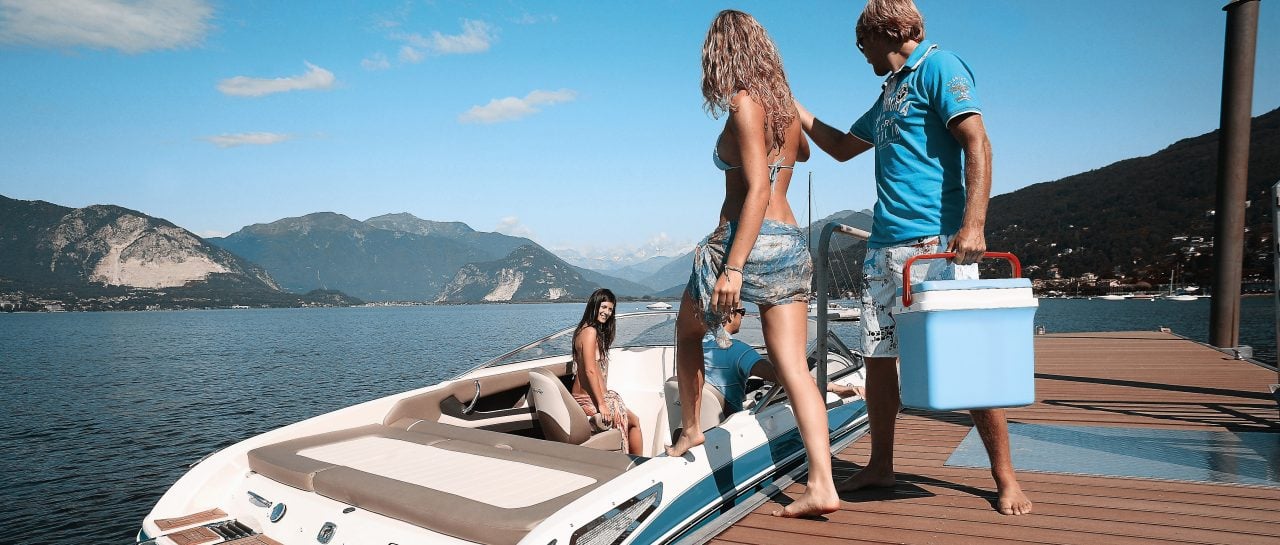PREPARING FOR A BOATING DAY

How to Prepare for a Day on the Water
As you plan to take your boat out for a day on water, you should make sure that you carry along all the essentials so that you have a safe trip and don’t miss out on the fun. We have categorized the items you’ll need into three categories – Safety, Navigation and Personal Essentials.
Before we get to the list of items, you’ll want to decide the bag to pack your items in. For leisurely trips on a pontoon boat, a typical canvas bag or backpack will work well. For more adventure focused outings, however, a dry bag is recommended for your more important items.
Safety
We can’t over-emphasize the importance of carrying all of the necessary safety equipment. A number of these items are required by law to be onboard – see Boater Safety for more details and check your local regulations to be sure you are in full compliance. Having everything in place will allow you to enjoy your day while being ready to respond to any possible event.
Personal Floatation Device / Life Jacket – It’s always recommended to wear a life jacket while on the water. At a minimum, you must have a life jacket for every person onboard, and all children under a certain age must wear life jackets at all times when on the water- verify age with your local regulations.
Air Horn & Whistle – These sound signals will allow you to call for help if required. Carry multiple sound signals (at least 2).
Flashlight – A waterproof flashlight may come in handy, especially if you plan to stay on water in the evening.
Fire Extinguisher – Make sure you have a fire extinguisher on board to minimize threat of fire onboard.
Lines – Don't forget to have lines (ropes) available to handle the boat on the dock and when returning at the end of the day!
Laser Flare/Flare Gun – A visual distress signal is required to be carried and comes to use when you need help. You may want to carry both, day-time and night-time signals.
Throw Cushion – You are required to carry a throw cushion or a ring. A throw cushion can also add to your comfort while you are seated on the boat.
Personal Location Beacon (EPIRB) – An emergency locator beacon that will transmit your exact position.
Other Safety Items – It is recommended to carry some extra rope, batteries, ties, a waterproof black tape and miscellaneous tools. You never know when you might need them.
Navigation
Whenever leaving your local waters, it is advisable to carry the equipment required to navigate
Cell Phone – There are a number of mobile apps that you can use for nautical navigation, many of which work even outside of cell service range if properly planned in advance.
GPS – If your boat does not have built-in GPS, you may want to carry a portable GPS system, especially if venturing offshore.
Chart – Although you may have GPS, a nautical chart is an important backup if the GPS or the electronic systems don’t work properly.
VHF Radio – You may not always get network reception on your cell phone. A VHF radio will help you call for emergency assistance, calling other boats or contacting the Coast Guard.
Personal Essentials
Water – It is important to stay hydrated when boating – remember to pack water for you and all of your passengers, especially small children.
Snacks – It always helps to carry some snacks with you, especially if you plan to stay out for long. You don’t want the hunger pangs to spoil your mood.
Cooler – It can get hot on the water fast, so pack up a cooler with cold water and other drinks to stay hydrated on the water.
Portable Phone Charger – You’ll likely use your cell phone for navigation, music and taking photographs. Having a portable charger (or charging cable if your boat is equipped) would ensure your phone does not run out of charge.
Phone Case/Strap – Phones don’t float, so if you’re using your phone around the boat or on the dock be sure to keep it attached to something to prevent losing it!
First Aid Kit – Always keep a first aid kit in your boat, equipped with bandages, ointment, pain killers etc.
Garbage Bags – You want to keep the boat and your surroundings clean. Always carry some garbage bags to deposit waste.
Sunscreen – Sunscreen is your best friend on a hot summer day on the water. Protect your skin from UV rays and reapply throughout the day.
Foul Weather Gear – Always check the weather forecast before you head out. You may face inclement weather, so it’s advisable to carry a rain jacket or a warm jacket if it may get cold.
Wetsuit / Swimwear – Carry your bathing suits for a dip in the water. You don’t want to miss out on getting into the water just because you forgot to bring one.
Shoes – You should be wearing non-slippery, non-marking shoes or slippers. Boat shoes, flip flops, sneakers – take your pick, but remember they will most likely get wet.
Sunglasses – Take some sunglasses along to keep out the glare and protect your eyes from the sun. Eyewear retainers such as croakies or other products are recommended to prevent dropping your sunglasses in the water.
Towels – Carry extra towels and stay dry. Also carry a plastic bag to store your wet clothes.
Other – Depending on what activities you have planned, carry tubes, wakeboards and /or fishing rods.


